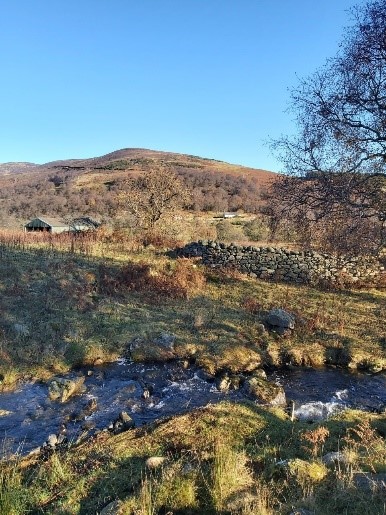12 November 2020
Trouble in the Hills
By J R Thomas
 This week was to be a considered analysis of how Joe Biden won a great historic victory, returning the US to its democratic liberal roots. Or possibly how Donald Trump won a great historic victory, continuing the US on a path of populist radical reform. But that is going to have to be delayed, like the Senatorial contest to be re-run in Georgia, in this case while the scribblers and analysts and your correspondent try to work out what has happened, other than that Old Joe has won. So back to that next week.
This week was to be a considered analysis of how Joe Biden won a great historic victory, returning the US to its democratic liberal roots. Or possibly how Donald Trump won a great historic victory, continuing the US on a path of populist radical reform. But that is going to have to be delayed, like the Senatorial contest to be re-run in Georgia, in this case while the scribblers and analysts and your correspondent try to work out what has happened, other than that Old Joe has won. So back to that next week.
In the meantime the north of this kingdom has been enjoying what in November passes for a heatwave, and the hills were calling. So before the borders closed and travel was locked down, over the Debateable Lands fled your correspondent to find out what troubles the highland gamekeeper in this covid year.
Not Covid-19, for sure. You can’t get much more distanced than a keeper, spending most of his (or her) time outside, keeping astonishingly fit. Even when the sporting guests turn up, although all the proper precautions are taken (some of us are getting on a bit after all), the outdoor life and Scottish sunshine – and evening treatment from the finest malts – should ensure good health. But for the poor gamekeeper life is not easy when he sits down in the evening to do his paperwork or read his sporting publications.
For those on the high hills, grouse are the top trouble; the anti-field sports lobby does not like grouse shooting and is determined, if not put a stop to it, to at least get it highly regulated. The Royal Society for the Protection of Birds (known in sporting quarters as the Royal Society for the Prevention of Birds) but more simply the RSPB, which was formerly relatively neutral or even friendly to game shooting and management, has changed its stance considerably in recent years, and would like all grouse shoots to be licenced. It is not entirely clear what this would permit, or indeed, deny, but once activities are licenced it is only too easy for licences to be withdrawn, singly or generally, perhaps because of worries about infectious diseases or land management issues or conservation strategies.
No matter that the managed grouse moors are a haven for many rare birds, as the anti-shooting writer Mary Colwell found to her surprise and detailed in her wonderful book Curlew Moon. As she walked from Ireland to the Norfolk coast in pursuit of the increasingly rare curlew she found that practically the only place it was still thriving was on grouse moors, along with snipe and hares. The suppression of rats and other vermin to protect the grouse had the side benefit of saving the long beakers and the long legged as well. Nevertheless, the RSPB, many of whose members prefer birds of prey above all else, is very concerned about the destruction of many large predator birds, such as eagles, hen harriers, and even buzzards, blames moorland managers and would like most grouse moors to cease to be managed. It has to be said that in the past moorland keepers certainly waged violent war on anything that would take grouse chicks, though things are generally greatly improved.
The latest RSPB target, and that of the anti-blood sports campaigner Chris Packham, is muirburn, or heather burning. On the high hills last week there were several columns of smoke – not the laird having a November picnic, but his keepers burning strips of old heather. The young grouse like this – they can really only eat the fresh shoots of heather that appear in the spring. Like so many things in the complex ecosystems of British wild places, if the heather was not periodically burnt it would eventually be replaced by scrub and then by tree cover and our heather moors would be no more. The UK has 75% of the world’s heather moors, and without management probably half of that would be gone within forty years, and most of it by the end of this century. But many upland birders would prefer no burning and no grouse keepering.
The lowland keeper does not doze in his fireside armchair any easier – and not just because this government is introducing a ban on most forms of open fire next year. His stuff of nightmares is a newish organisation called Wild Justice. This is not, as you may think, a bunch of lawyers with long hair and appalling habits, but a campaigning group set up by Chris Packham (yes, him again) and Mark Avery, who was conservation director of the RSPB for thirteen years, together with Ruth Tingay, a birds of prey expert. Their bright idea was to use the law to attack those who misbehave in wildlife management, but also to try to tighten up the regulation and legislation governing field sports, especially relating to birds.
Their first notable victory was to convince the courts that Natural England, a quango under the patronage of DEFRA (the Ministry of Farming and Rural Affairs), had misdirected itself when issuing general licenses. General licences permit farmers, landowners, and their agents to destroy birds that are damaging crops or habitat, such as pigeons and rooks. That meant that for a significant time in 2019 no pest control was permitted, although the shooters had the final victory when DEFRA took licencing under its direct control and reissued all the general licences. A further version this year saw Wild Justice win a case forbidding the release of reared pheasants within the wider curtilage of conservation areas. This appeared a major victory as it would make life difficult for many shooting estates, but DEFRA intervened once again to issue a general licence permitting this to happen, incorporating current safeguards. This issue will have not gone away though, and is likely to reappear before the courts.
What else? There is indeed a long list. The EU is banning the use of lead shot in cartridges, following research on the long term effects of lead in the food chain. The UK shooting bodies have already gone some way down this route with a five year transition to non-lead. The trouble there is that steel shot, the obvious alternative, is not good for the average gun, and non-toxic alternatives are very expensive – typically, five times the price. Even the City boys might blench at that, and many country shooters would have to retire their guns.
Beavers? Beavers might keep the keeper and his spaniels awake in the small hours. They are now likely to be widely re-introduced across the UK after centuries of extinction, not good for fishing and indeed for land management given the associated long term flooding issues. Shooters could probably live with beavers, but Paul Lister, a Scottish landowner, would like to go a lot further and reintroduce wolves on his large West Highland estate. This is an idea which is gaining increasing traction (though not generally, it should be said, with Mr Lister’s neighbours), not least because the Scottish deer population (the English one too) is out of control and ideally should be reduced by perhaps half. The problem is that wolf management might reduce the population of keepers by half too.
So, gentle reader, when the midnight sounds of a cat-fight wake you, think of the perils of both man and wilderness that keeps the distant gamekeeper awake. Indeed, there’s another; the increasing population of feral semi wildcats in the Scottish hills, busy feasting on the keepers’ pheasant chicks.


